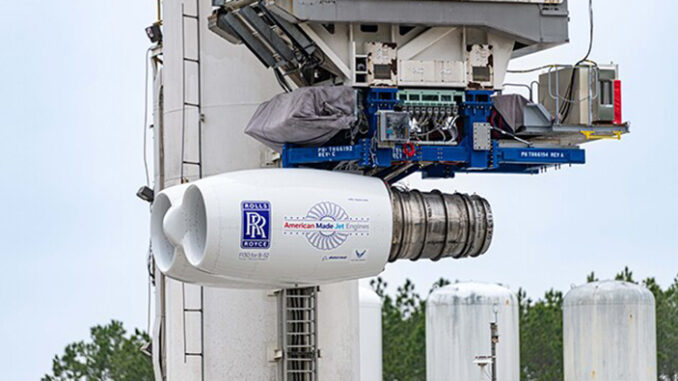Testing Of Rolls-Royce F130 Engines For The B-52 Bomber Has Begun

Rolls-Royce has begun testing F130 engines for the United States Air Force B-52 fleet at the NASA Stennis Space Center.
Rolls-Royce has announced it has launched F130 engine testing at the company’s outdoor test facility at the NASA Stennis Space Center in Mississippi, U.S., on Mar. 1, 2023. The RR F130 engines were selected in 2021 to replace the bomber’s Pratt & Whitney TF33-PW-103s, used on the Stratofortress fleet since the 1960s.
The TF-33 engine will no longer be supportable beyond 2030, so the B-52 Commercial Engine Replacement Program was kicked off in 2018, with GE Aviation, Pratt & Whitney and Rolls-Royce competing for the contract. The winning offer from Rolls-Royce is the military version of the BR725 engine used by the Gulfstream G650 business jet and already powering both the C-37 and E-11 BACN in service with the U.S. Air Force.
According to Rolls-Royce, the testing announced today marks the first time F130 engines have been tested in the dual-pod engine configuration of the B-52 aircraft. The engine testing at NASA Stennis Space Center, that follows the wind tunnel testing of the new engine nacelles, will focus on crosswind aerodynamic flow as well as confirming the successful operation of the engine’s digital controls system. Early results from the testing have been very positive with additional test data to be analyzed over the next several months.
The Air Force plans to finalize integration activities and deliver the first lot of B-52 modified aircraft in the 2026-2027 timeframe, with initial operational capability expected in 2030. The new engines are expected to remain on the B-52 for the reminder of the aircraft life, through at least 2050 increasing fuel efficiency and range, reducing emissions in unburned hydrocarbons, and significantly reducing maintenance costs.
F130 engines will be manufactured, assembled and tested at Rolls-Royce facilities in Indianapolis, the company’s largest production facility in the U.S. The company has invested $1 Billion in recent years to completely modernize manufacturing and testing facilities in Indiana, as well as for advanced technology.
